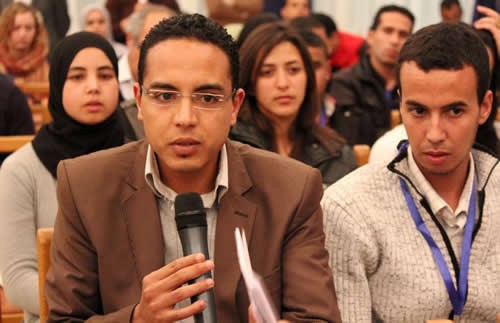
USAID works with local governing bodies, political parties and civil society to promote democratic reform, advocate for marginalized and disaffected groups, and improve participatory dialogue between government and citizens. By increasing the capacity of civil society to engage with the government and facilitating the development of institutionalized mechanisms for civic participation in government decision-making, Morocco will be better situated to implement its reform agenda in a peaceful and sustainable manner.
USAID is assisting political parties in becoming more responsive and representative while supporting civil society organizations (CSO) to build their management, organizational and advocacy capacity. The Civil Society Strengthening Program (2015-2019) in Morocco encourages greater engagement between CSOs and government institutions and improves civil society organizational capacity, with the goal of supporting CSOs and coalitions that engage in advocacy initiatives. Civic engagement is also strengthened through the electoral process. By reaching out and involving citizens at the grassroots level, USAID,through its Building Responsive and Representative Political Parties Project, is helping Moroccan political parties spearhead political reforms and play more assertive roles as champions of innovation and renewal. This program supports political parties’ commitment to citizen outreach at the local level and their ability to collect, aggregate, and analyze information on citizens’ needs and expectations. This enables parties to adopt and implement policy positions that effectively address citizens’ priorities while strengthening the roles of women and youth in political parties.
Matching expectations with opportunities for participation in civic life is also an important component in addressing security and stability in the country. Northern Morocco, particularly the area of Tangier and Tetouan has historically been an area where disenfranchised youth have been recruited into violent extremist activities. This area of Morocco suffers from high rates of illiteracy, school dropout and unemployment, and is known as a breeding ground for transnational terrorist networks. In order to reintegrate at-risk youth into mainstream society, USAID's Favorable Opportunities to Reinforce Self-Advancement for Today’s Youth program (FORSATY) addresses drivers of violent extremism and the program includes non-formal education and vocational training, the provision of basic social services, career counseling and job placement. By reducing social, political and economic exclusion and countering the narratives of organized crime groups, the drug trade and unregistered religious groups, The FORSATY programs will continue to provide targeted youth with opportunities for positive life choices.
Furthermore, USAID has launched a new Community Oriented Policing Activity designed to promote greater cooperation within communities to prevent crime and to address expressed concerns over the safety, security, and well-being of local residents in their communities. This USAID activity consists of specific strategies to encourage open communication and increase trust between citizens, particularly at-risk youth, the police and government leaders.








Comment
Make a general inquiry or suggest an improvement.